
Option - November/December 1988
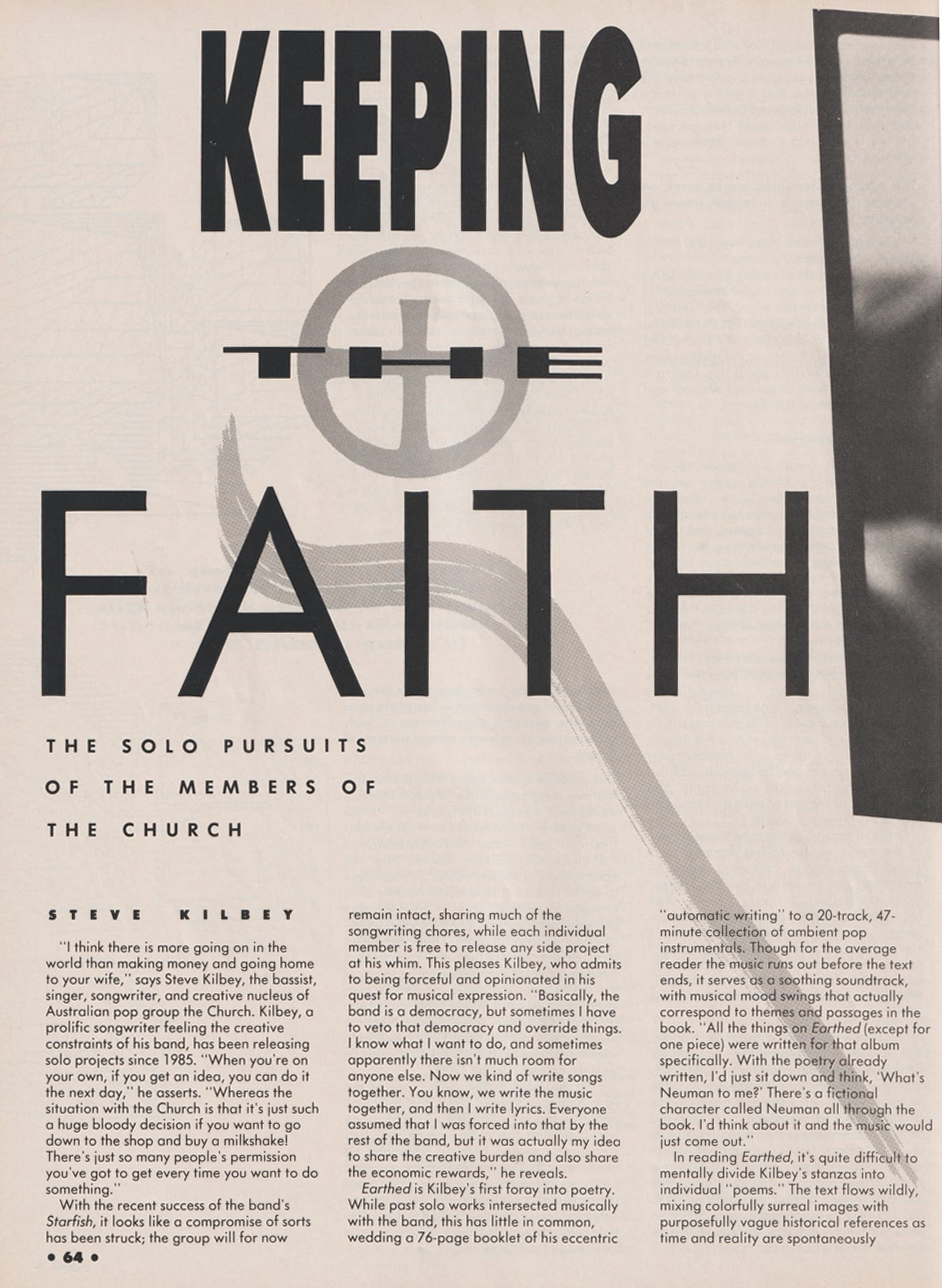
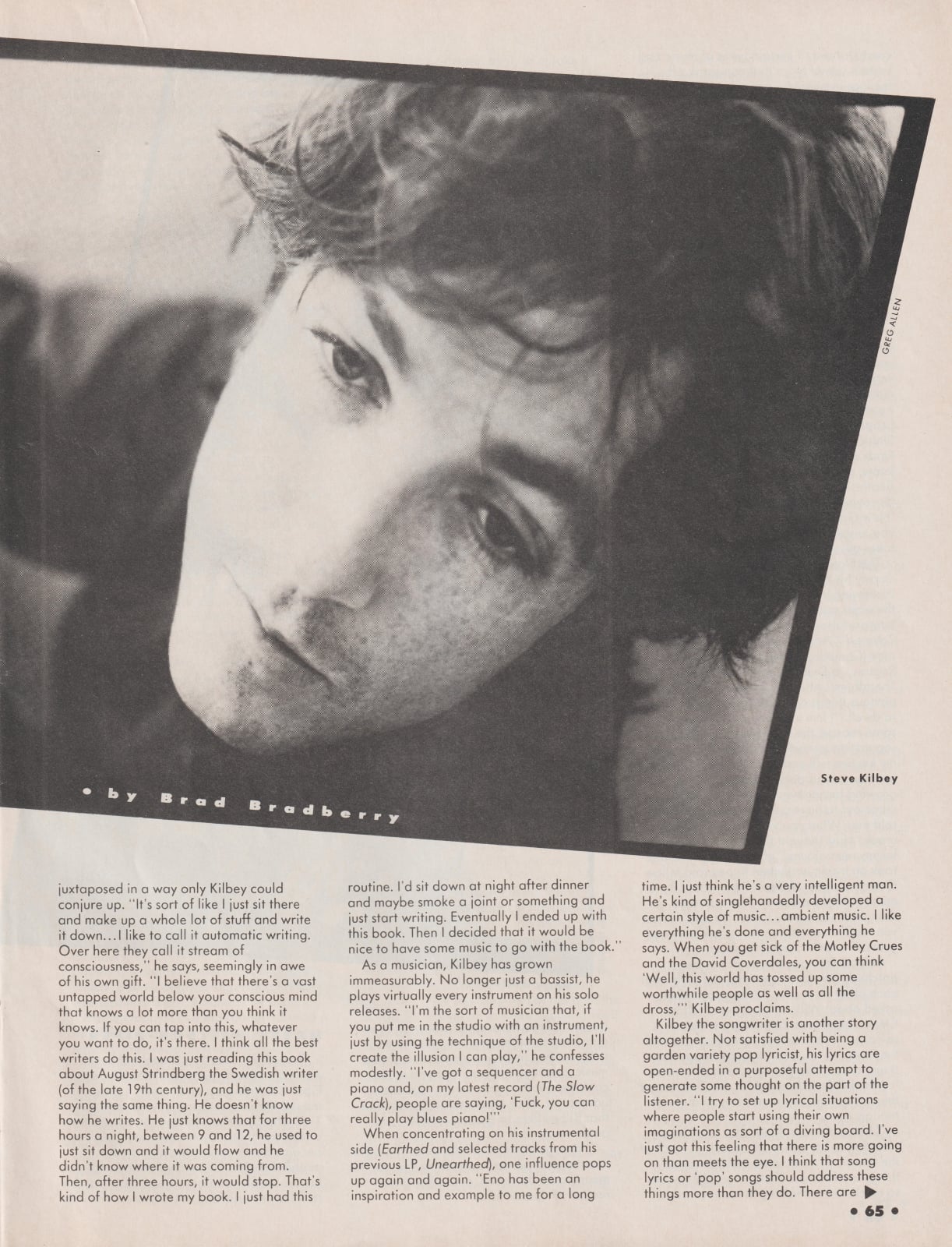
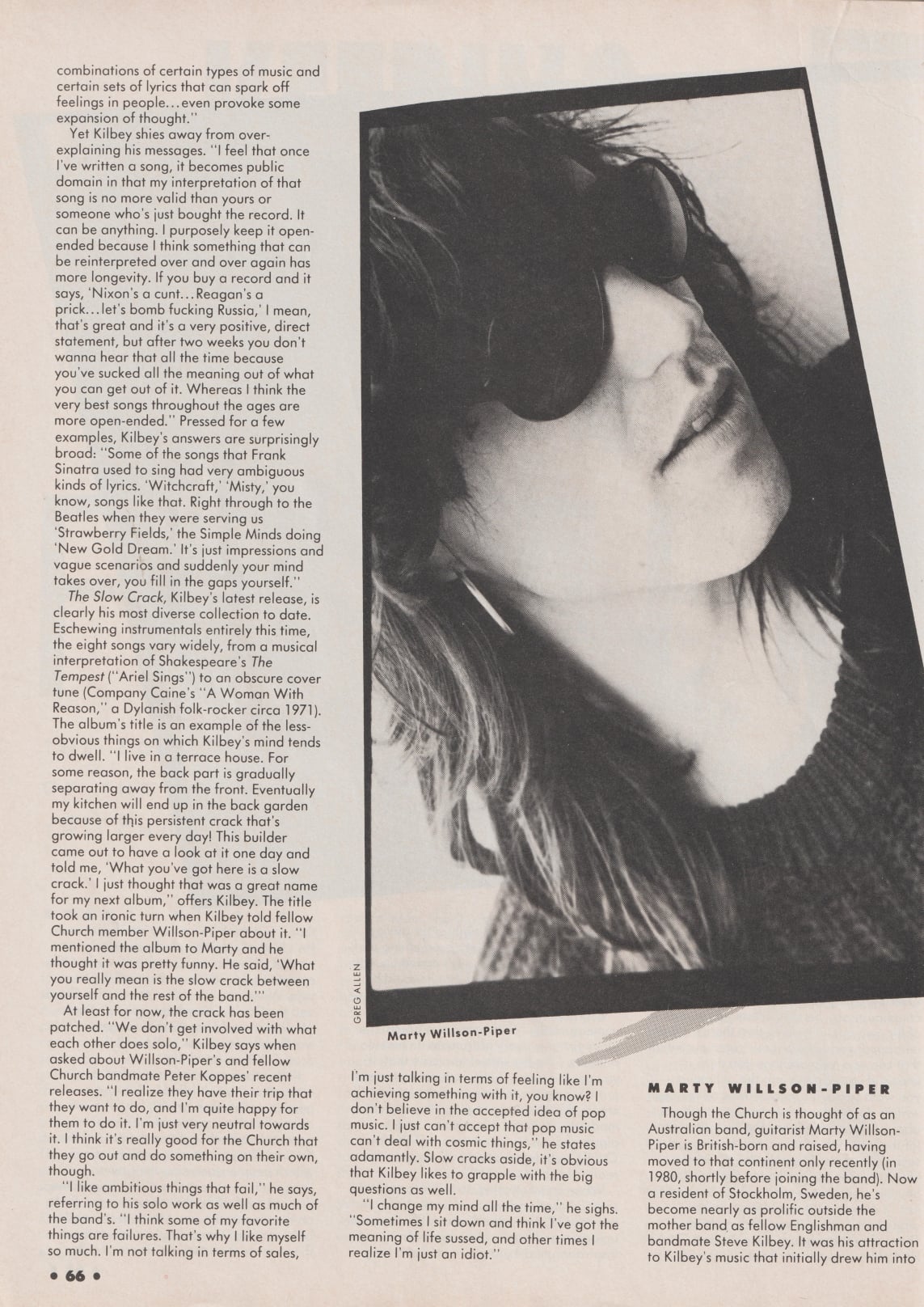
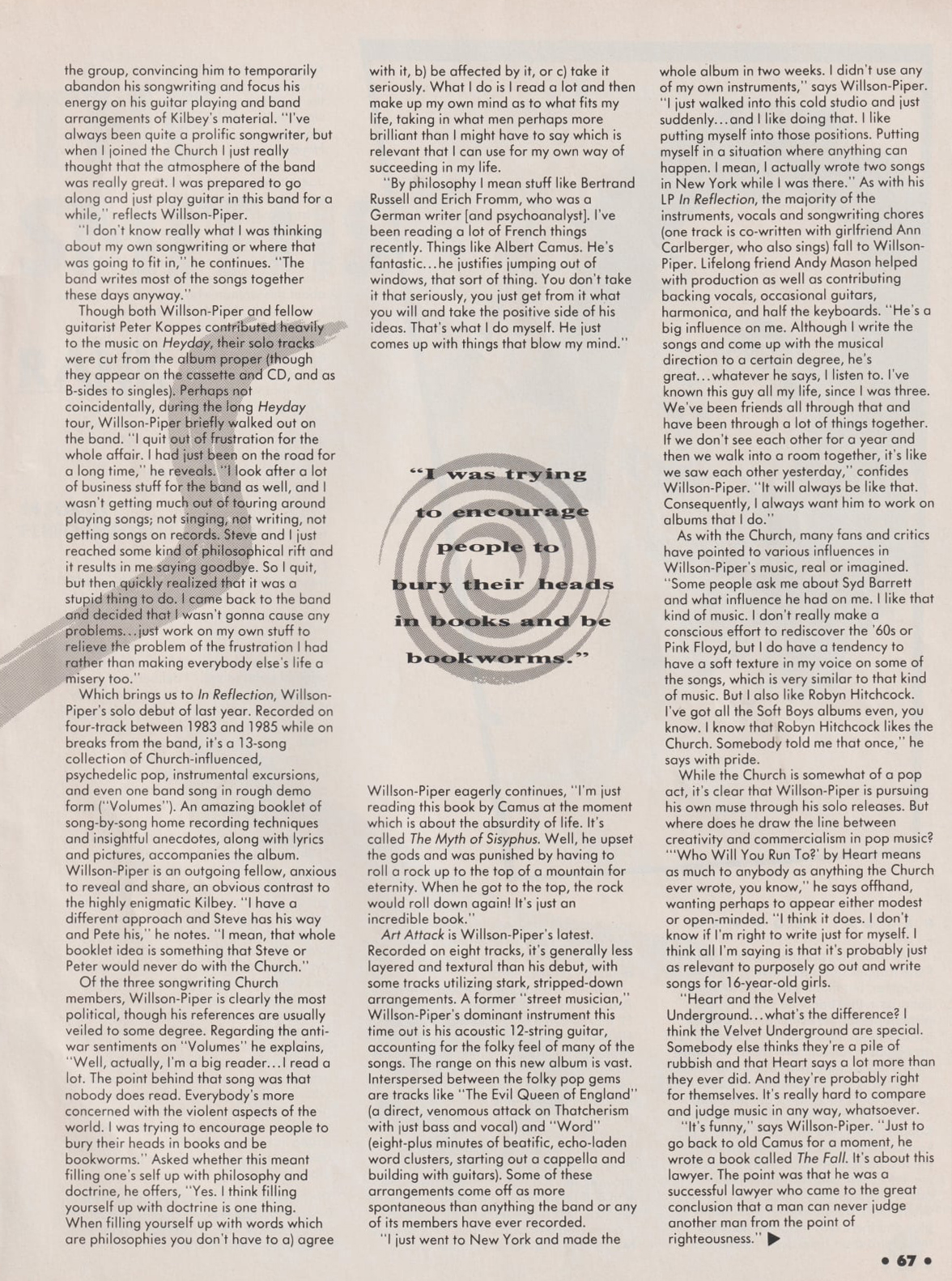
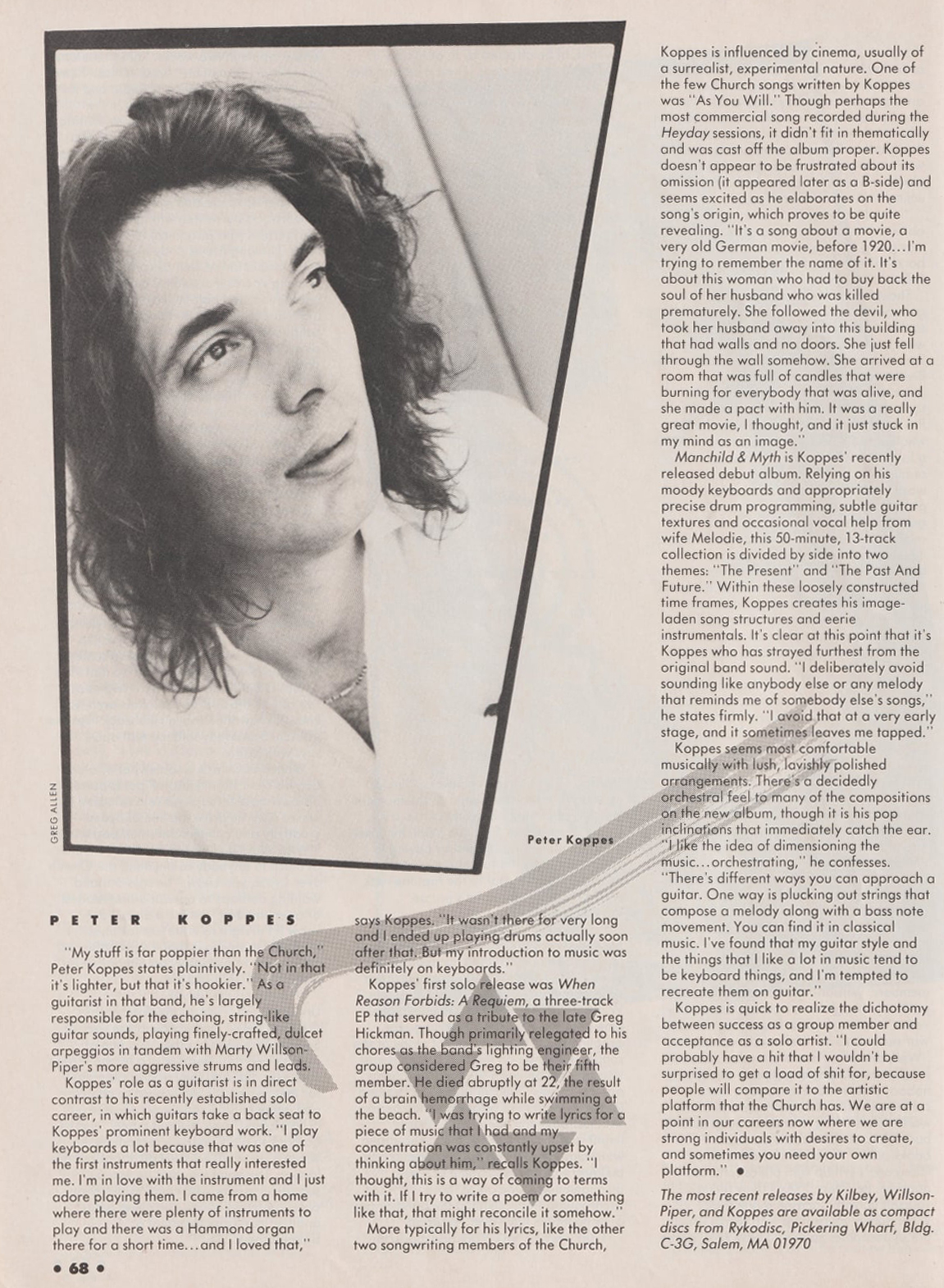

Option - November/December 1988





(transcription from the old Shadow Cabinet website)
From Options magazine, circa 1988
Keeping the Faith:
The solo pursuits of the members of the Church
by Brad Bradberry
S T E V E K I L B E Y
"I think there is more going on in the world than making money and going home
to your wife," says Steve Kilbey, the bassist, singer, songwriter, and
creative nucleus of Australian pop group the Church. Kilbey, a prolific
songwriter feeling the creative constraints of his band, has been releasing
solo projects since 1985. "When you're on your own, if you get an idea, you
can do it the next day," he asserts. "Whereas the situation with the Church is
that it's just such a huge bloody decision if you want to go down to the shop
and buy a milkshake! There's just so many people's permission you've got to
get every time you want to do something."
With the recent success of the band's Starfish, it looks like a compromise of
sorts has been struck; the group will for now remain intact, sharing much of
the songwriting chores, while each individual member is free to release any
side project at his whim. This pleases Kilbey, who admits to being forceful
and opinionated in his quest for musical expression. "Basically, the band is
a democracy, but sometimes I have to veto that democracy and override things.
I know what I want to do, and sometimes apparently there isn't much room for
anyone else. Now we kind of write songs together. You know, we write the
music together, and then I write lyrics. Everyone assumed that I was forced
into that by the rest of the band, but it was actually my idea to share the
creative burden and also share the economic rewards," he reveals.
Earthed is Kilbey's first foray into poetry. While past solo works intersected
musically with the band, this has little in common, wedding a 76-page booklet
of his eccentric "automatic writing" to a 20-track, 47-minute collection of
ambient pop instrumentals. Though for the average reader the music runs out
before the text ends, it serves as a soothing soundtrack, with musical mood
swings that actually correspond to themes and passages in the book. "All the
things on Earthed (except for one piece) were written for that album
specifically. With the poetry already written, I'd just sit down and think,
'What's Neuman to me?' There's a fictional character called Neuman all through
the book. I'd think about it and the music would just come out."
In reading Earthed, it's quite difficult to mentally divide Kilbey's stanzas
into individual "poems." The text flows wildly, mixing colorfully surreal
images with purposefully vague historical references as time and reality are
spontaneously juxtaposed in a way only Kilbey could conjure up. "It's sort of
like I just sit there and make up a whole lot of stuff and write it down . . .
I like to call it automatic writing. Over here they call if stream of
consciousness," he says, seemingly in awe of his own gift. "I believe that
there's a vast untapped world below your conscious mind that knows a lot more
than you think it knows. If you can tap into this, whatever you want to do,
it's there. I think all the best writers do this. I was just reading this book
about August Strindberg the Swedish writer (of the late 19th century), and he
was saying the same thing. He doesn't know how he writes. He just knows that
for three hours a night, between 9 and 12, he used to just sit down and it
would flow and he didn't know where it was coming from. Then, after three
hours, it would stop. That's kind of how I wrote my book. I just had this
routine. I'd sit down at night after dinner and maybe smoke a joint or
something and just start writing. Eventually I ended up with this book. Then I
decided that it would be nice to have some music to go with the book."
As a musician, Kilbey has grown immeasurably. No longer just a bassist, he
plays virtually every instrument on his solo releases. "I'm that sort of
musician that, if you put me in the studio with an instrument, just by using
the technique of the studio, I'll create the illusion I can play," he
confesses modestly. "I've got a sequencer and a piano and, on my latest record
(The Slow Crack), people are saying, 'Fuck, you can really play blues piano!'"
When concentrating on his instrumental side (Earthed and selected tracks from
his previous LP, Unearthed), one influence pops up again and again. "Eno has
been an inspiration and example to me for a long time. I just think he's a
very intelligent man. He's kind of singlehandedly developed a certain style of
music . . . ambient music. I like everything he's done and everything he says.
When you get sick of the Motley Crues and the David Coverdales, you can think
'Well, this world has tossed up so me worthwhile people as well as all the
dross,'" Kilbey proclaims.
Kilbey the songwriter is another story altogether. Not satisfied with being a
garden variety pop lyricist, his lyrics are open-ended in a purposeful attempt
to generate some thought on the part of the listener. "I try to set up lyrical
situations where people start using their own imaginations as sort of a diving
board. I've just got this feeling that there is more going on than meets the
eye. I think that song lyrics or 'pop' songs should address these things more
than they do. There are combinations of certain types of music and certain
sets of lyrics that can spark off feelings in people . . . even provoke some
expansion of thought."
Yet Kilbey shies away from over-explaining his messages. "I feel that once
I've written a song, it becomes public domain in that my interpretation of
that song is no more valid than yours or someone who's just bought the
record. It can be anything. I purposely keep it open ended because I think
something that can be reinterpreted over and over again has more longevity.
If you buy a record and it says, 'Nixon's a cunt . . Reagan's a prick . . .
let's bomb fucking Russia,' I mean, that's great and it's a very positive,
direct statement, but after two weeks you don't wanna hear that all the time
because you've sucked all the meaning out of what you can get out of it.
Whereas I think the very best songs throughout the ages are more open-ended."
Pressed for a few examples, Kilbey's answers are surprisingly broad. "Some of
the songs that Frank Sinatra used to sing had very ambiguous kinds of lyrics.
'Witchcraft,' 'Misty,' you know, songs like that. Right through to the
Beatles when they were serving us 'Strawberry Fields,' the Simple Minds doing
'New Gold Dream.' It's just impressions and vague scenarios and suddenly your
mind takes over, you fill in the gaps yourself."
The Slow Crack, Kilbey's latest release, is clearly his most diverse
collection to date. Eschewing instrumentals entirely this time, the eight
songs vary widely, from a musical interpretation of Shakespeare's The Tempest
("Ariel Sings") to an obscure cover tune (Company Caine's "A Woman With
Reason," a Dylanish folk-rocker circa 1971). The album's title is an example
of the less obvious things on which Kilbey's mind tends to dwell. "I live in
a terrace house. For some reason, the back part is gradually separating away
from the front. Eventually my kitchen will end up in the back garden because
of this persistent crack that's growing larger every day! This builder came
out to have a look at it one day and told me, 'What you've got here is a
slow crack.' I just thought that was a great name for my next album," offers
Kilbey. The title took an ironic turn when Kilbey told fellow Church member
Willson-Piper about it. "I mentioned the album to Marty and he thought it was
pretty funny. He said, 'What you really mean is the slow crack between
yourself and the rest of the band.'"
At least for now, the crack has been patched. "We don't get involved with what
each other does solo," Kilbey says when asked about Willson-Piper's and fellow
Church bandmate Peter Koppes' recent releases. "I realize they have their trip
that they want to do, and I'm quite happy for them to do it. I'm just very
neutral towards it. I think it's really good for the Church that they go out
and do something on their own, though.
"I like ambitious things that fail," he says, referring to his solo work as
well as much of the band's. "I think some of my favorite things are failures.
That's why I like myself so much. I'm not talking in terms of sales, I'm just
talking in terms of feeling like I'm achieving something with it, you know? I
don't believe in the accepted idea of pop music. I just can't accept that pop
music can't deal with cosmic things," he states adamantly. Slow cracks aside,
it's obvious that Kilbey likes to grapple with the big questions as well
"I change my mind all the time," he sighs. "Sometimes I sit down and think
I've got the meaning of life sussed, and other times I realize I'm just an
idiot."
M A R T Y W I L L S O N - P I P E R
Though the Church is thought of as an Australian band, guitarist Marty
Willson-Piper is British-born and raised, having moved to that continent only
recently (in 1980, shortly before joining the band). Now a resident of
Stockholm, Sweden, he's become nearly as prolific outside the mother band as
fellow Englishman and bandmate Steve Kilbey. It was his attraction to Kilbey's
music that initially drew him into the group, convincing him to temporarily
abandon his songwriting and focus his energy on his guitar playing and band
arrangements of Kilbey's material. "I've always been quite a prolific
songwriter, but when I joined the Church I just really thought that the
atmosphere of the band was really great. I was prepared to go along and just
play guitar in this band for a while," reflects Willson-Piper
"I don't know really what I was thinking about my own songwriting or where
that was going to fit in," he continues. "The band writes most of the songs
together these days anyway."
Though both Willson-Piper and fellow guitarist Peter Koppes contributed
heavily to the music on Heyday, their solo tracks were cut from the album
proper (though they appear on the cassette and CD, and as B-sides to singles).
Perhaps not coincidentally, during the long Heyday tour, Willson-Piper briefly
walked out on the band. "I quit out of frustration for the whole affair. I
had just been on the road a long time," he reveals. "I look after a lot of the
business stuff for the band as well, and I wasn't getting much out of touring
around playing songs; not singing, not writing, not getting songs on records.
Steve and I just reached some kind of philosophical rift and it results in me
saying goodbye. So I quit, but then quickly realized that it was a stupid
thing to do. I came back to the band and decided I wasn't gonna cause any
problems . . . just work on my own stuff to relieve the problem of the
frustration I had rather than making everybody else's life a misery too."
Which brings us to In Reflection, Willson-Piper's solo debut of last year.
Recorded on four-track between 1983 and 1985 while on breaks from the band,
it's a 13-song collection of Church-influenced, psychedelic pop, instrumental
excursions, and even one band song in rough demo form ("Volumes"). An amazing
booklet of song-by-song home recording techniques and insightful anecdotes,
along with lyrics and pictures, accompanies the album. Willson-Piper is an
outgoing fellow, anxious to reveal and share, an obvious contrast to the
highly enigmatic Kilbey. "I have a different approach and Steve has his way
and Pete his," he notes. "I mean that whole booklet idea is something that
Steve or Peter would never do with the Church."
Of the three songwriting Church members, Willson-Piper is clearly the most
political, though his references are usually veiled to some degree. Regarding
the anti-war sentiments on "Volumes" he explains, "Well, actually, I'm a big
reader. I read a lot. The point behind that song was that nobody does read.
Everybody's more concerned with the violent aspects of the world. I was trying
to encourage people to bury their heads in books and be bookworms." Asked
whether this meant filling one's self up with philosophy and doctrine, he
offers, "Yes. I think filling yourself up with doctrine is one thing. When
filling yourself up with words which are philosophies you don't have to a)
agree with, b) be affected by it, or c) take it seriously.
"By philosophy I mean stuff like Bertrand Russell and Erich Fromm, who was a
German writer [and psychologist]. I've been reading a lot of French things
recently. Things like Albert Camus. He's fantastic . . . he justifies jumping
out of windows, that sort of thing. You don't take it that seriously, you
just get from it what you will and take the positive side of his ideas.
That's what I do myself. He just comes up with things that blow my mind."
Willson-Piper eagerly continues, "I'm just reading this book by Camus at the
moment which is about the absurdity of life. It's called The Myth of
Sisyphus. Well, he upset the gods and was punished by having to roll a rock
up to the top of a mountain for eternity. When he got to the top, the rock
would roll down again! It's just an incredible book."
Art Attack is Willson-Piper's latest. Recorded on eight tracks, it's generally
less layered and textural than his debut, with some tracks utilizing stark,
stripped-down arrangements. A former "street musician," Willson-Piper's
dominant instrument this time out is his acoustic 12-string guitar, accounting
for the folky feel of many of the songs. The range on this new album is vast.
Interspersed between the folky pop gems are tracks like "Evil Queen of
England" (a direct, venomous attack on Thatcherism with just bass and vocal)
and "Word" (eight-plus minutes of beatific, echo-laden word clusters, starting
out a cappella and building with guitars). Some of these arrangements come
off as more spontaneous than anything the band or any of its mem
bers have ever recorded.
"I just went to New York and made the whole album in two weeks. I didn't use
any of my own instruments," says Willson-Piper. "I just walked into this cold
studio and just suddenly . . . and I like doing that. I like putting myself
into those positions. Putting myself in a situation where anything can happen.
I mean, I actually wrote two songs in New York while I was there." As with his
LP In Reflection, the majority of the instruments, vocals and songwriting
chores (one track is co-written with girlfriend Ann Carlberger, who also
sings) fall to Willson-Piper. Lifelong friend Andy Mason helped with
production as well as contributing backing vocals, occasional guitars,
harmonica, and half the keyboards. "He's a big influence on me. Although I
write the songs and come up with the musical direction to a certain degree,
he's great . . . whatever he says, I listen to. I've known this guy all my
life, since I was three. We've been friends all through that and have been
through a lot of things together. If we don't see each other for a year and
then we walk into a room together, it's like we saw each other yesterday,"
confides Willson-Piper. "It will always be like that. Consequently, I always
want him to work on albums that I do."
As with the Church, many fans and critics have pointed to various influences
in Willson-Piper's music, real or imagined. "Some people ask me about Syd
Barrett and what influence he had on me. I like that kind of music. I don't
really make a conscious effort to rediscover the '60s or Pink Floyd, but I do
have a tendency to have a soft texture in my voice on some of the songs,
which is very similar to that kind of music. But I also like Robyn Hitchcock.
I've got all the Soft Boys albums even, you know. I know that Robyn Hitchcock
likes the Church. Somebody told me that once," he says with pride.
While the Church is somewhat of a pop act, it's clear that Willson-Piper is
pursuing his own muse through his solo releases. But where does he draw the
line between creativity and commercialism in pop music? "'Who Will You Run
To?' by Heart means as much to anybody as anything the Church ever wrote, you
know," he says offhand, wanting perhaps to appear either modest or open-
minded. "I think it does. I don't know if I'm right to write just for myself.
I think all I'm saying is that it's probably just as relevant to purposely go
out and write songs for 16-year-old girls.
"Heart and the Velvet Underground . . . what's the difference? I think the
Velvet Underground are special. Somebody else thinks they're a pile of rubbish
and that Heart says a lot more than they ever did. And they're probably right
for themselves. It's really hard to compare and judge music in any way,
whatsoever.
"It's funny," says Willson-Piper. "Just to go back to old Camus for a moment,
he wrote a book called The Fall. It's about this lawyer. The point was that he
was a successful lawyer who came to the great conclusion that a man can never
judge another man from the point of righteousness."
P E T E R K O P P E S
"My stuff is far poppier than the Church," Peter Koppes states plaintively.
"Not in that it's lighter, but that it's hookier." As a guitarist in the band,
he's largely responsible for the echoing, string-like guitar sounds, playing
finely-crafted dulcet arpeggios in tandem with Marty Willson-Piper's more
aggressive strums and leads.
Koppes' role as a guitarist is in direct contrast to his recently established
solo career, in which guitars take a back seat to Koppes' prominent keyboard
work. "I play keyboards a lot because that was one of the first instruments
that really interested me. I'm in love with the instrument and I just adore
playing them. I came from a home where there were plenty of instruments to
play and there was a Hammond organ there for a short time . . . and I loved
that," says Koppes. "It wasn't there for very long and I ended up playing
drums actually soon after that. But my introduction to music was definitely on
keyboards."
Koppes' first solo release was When Reason Forbids: A Requiem, a three-track
EP that served as a tribute to the late Greg Hickman. Though primarily
relegated to his chores as the band's lighting engineer, the group considered
Greg to be their fifth member. He died abruptly at 22, the result of a brain
hemorrhage while swimming at the beach. "I was trying to write lyrics for a
piece of music that I had and my concentration was constantly upset by
thinking about him," recalls Koppes. "I thought, this is a way of coming to
terms with it. If I try to write a poem or something like that, that might
reconcile it somehow."
More typically for his lyrics, like the other two songwriting members of the
Church, Koppes is influenced by cinema, usually of a surrealist, experimental
nature. One of the few Church songs written by Koppes was "As You Will."
Though perhaps the most commercial song recorded during the Heyday sessions,
it didn't fit in thematically and was cast off the album proper. Koppes
doesn't appear to be frustrated about its omission (it appeared later as a B-
side) and seems excited as he elaborates on the song's origin, which proves to
be quite revealing. "It's a song about a movie, a very old German movie,
before 1920 . . . I'm trying to remember the name of it. It's about this woman
who had to buy back the soul of her husband who was killed prematurely. She
followed the devil, who took her husband away into this building that had
walls and no doors. She just fell through the wall somehow. She arrived at a
room that was full of candles that were burning for everybody that was alive,
and she made a pact with him. It was a really great movie, I thought, and it
just stuck in my mind as an image."
Manchild & Myth is Koppes' recently released debut album. Relying on his moody
keyboards and appropriately precise drum programming, subtle guitar textures
and occasional vocal help from wife Melodie, this 50-minute, 13-track
collection is divided by side into two themes: "The Present" and "The Past
And Future." Within these loosely constructed time frames, Koppes creates his
image-laden song structures and eerie instrumentals. It's clear at this point
that it's Koppes who has strayed furthest from the original band sound. "I
deliberately avoid sounding like anybody else or any melody that reminds me
of somebody else's songs," he states firmly. "I avoid that at a very early
stage, and it sometimes leaves me tapped."
Koppes seems most comfortable musically with lush, lavishly polished
arrangements. There's a decidedly orchestral feel to many of the compositions
on the new album, though it is his pop inclinations that immediately catch
the ear. "I like the idea of dimensioning the music . . . orchestrating," he
confesses. "There's different ways you can approach a guitar. One way is
plucking out strings that compose a melody along with a bass note movement.
You can find it in classical music. I've found that my guitar style and the
things that I like a lot in music tend to be keyboard things, and I'm tempted
to recreate them on guitar."
Koppes is quick to realize the dichotomy between success as a group member and
acceptance as a solo artist. "I could probably have a hit that I wouldn't be
surprised to get a load of shit for, because people will compare it to the
artistic platform that the Church has. We are at a point in our careers now
where we are strong individuals with desires to create, and sometimes you need
your own platform."
Return to 1988 index